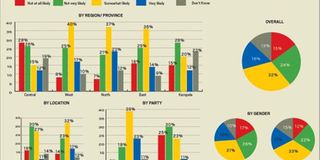Only 48% think government can solve top issues

What you need to know:
New poll shows problems worrying Ugandans most but less than one in two believe the government can solve them in what is left of its term.
KAMPALA
Health, high taxation, poverty, infrastructure, unemployment and management of the economy are the country’s most pressing problems according to a new poll but only 48 per cent of Ugandans believe President Museveni’s government can resolve them in the current term.
According to the latest Afrobarometer Survey, a research project measuring public perception on social, political and economic trends in at least 20 African countries including Uganda, citizens are also keen on seeing the government deal with corruption, electricity supply and provision of quality education.
The research, however, delivered mixed reactions from participating citizens about their perception of the likelihood of Mr Museveni addressing the country’s 10 most important problems.
Asked to say how likely they thought that government will solve these problems “within the next five years”, close to five out of every 10 Ugandans (48 per cent) expressed optimism that Mr Museveni, in power for 26 years, has a realistic chance within his current term to achieve what he promised in his re-election manifesto- lifting Uganda to a middle-income country.
Rating
However, a combined total of 39 per cent of Ugandans said the government is “not at all likely” and “not very likely” to solve these key problems the country is facing, while 13 per cent said they “don’t know.”
The research, whose findings this newspaper has serialised since Monday, revealed that government approval ratings have dropped to 26 per cent barely a year after Mr Museveni’s resounding 2011 68 per cent electoral victory, with as many as eight out of every 10 Ugandans admitting that they have lost confidence in the NRM leader’s handling of the economy.
The respondents cited spiralling inflation, government reckless and wasteful spending and the failure to create jobs for thousands of Uganda’s unemployed citizens as some of the reasons to hand the state these negative rankings.
Government speaks
Information Minister Mary Karooro Okurut (Bushenyi Woman, NRM) said in a Tuesday statement that government “has addressed some of the most pressing challenges leading to the drop in national inflation figures as evidenced by the current relatively low prices of locally produced items like sugar and food, as well as fuel, and stable exchange rates.”
She added: “However, Government admits that there are still challenges in areas like unemployment; but these are being addressed through interventions like the Shs25 billion Youth Fund that has been released.”
The findings, however, come as indictment on the government’s record in satisfying the aspirations of its citizens who seem to be losing confidence that Mr Museveni can turn around the fortunes of this country with almost 20 per cent of his five year term used up already.
Mr Museveni flagged improved service delivery and more jobs as the centrepiece of the NRM political platform for his fourth term in office, aptly titling his party’s 2011-2016 manifesto: “Prosperity for All; better service delivery and job creation.”
However, much of the first year of his current term has been characterised by a wave of civil unrest, fanned in part by the Opposition, a matter that has presented big challenges in maintaining public order, while the government has also struggled to maintain a grip on Parliament where the NRM party commands a majority.
Shaky term
During this period alone, Mr Museveni has had to deal with a range of strikes from city traders, teachers and taxi drivers, a tense atmosphere compounded by the opposition led walk-to-work demonstrations.
Because the government has busied itself in putting out these political fires, critics have suggested, it has appeared to do more of the things it did not plan to do and little of its re-election campaign pledges.
Meanwhile, the government appeared to hit panic buttons with reports emerging that Cabinet discussed this newspaper’s serialisation of the Afrobarometer Round 5 survey at their weekly meeting yesterday.
A Cabinet source said a decision was taken to have the government launch a rebuttal campaign to the research findings amid claims that some ministers accused this newspaper of publishing the research to incite disaffection against the government.
Invitations were sent out yesterday afternoon inviting journalists to show up at the Media Centre in Kampala this morning for a press briefing by State Minister for Economic Monitoring Henry Banyenzaki (Rubanda West, NRM) “responding to the Afrobarometer Survey and other Economic issues.”



